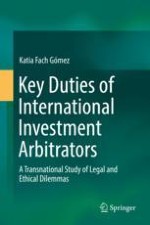
2019 | OriginalPaper | Buchkapitel
1. Introduction. A Transnational Study of Legal and Ethical Dilemmas
verfasst von : Katia Fach Gómez
Erschienen in: Key Duties of International Investment Arbitrators
Aktivieren Sie unsere intelligente Suche, um passende Fachinhalte oder Patente zu finden.
Wählen Sie Textabschnitte aus um mit Künstlicher Intelligenz passenden Patente zu finden. powered by
Markieren Sie Textabschnitte, um KI-gestützt weitere passende Inhalte zu finden. powered by